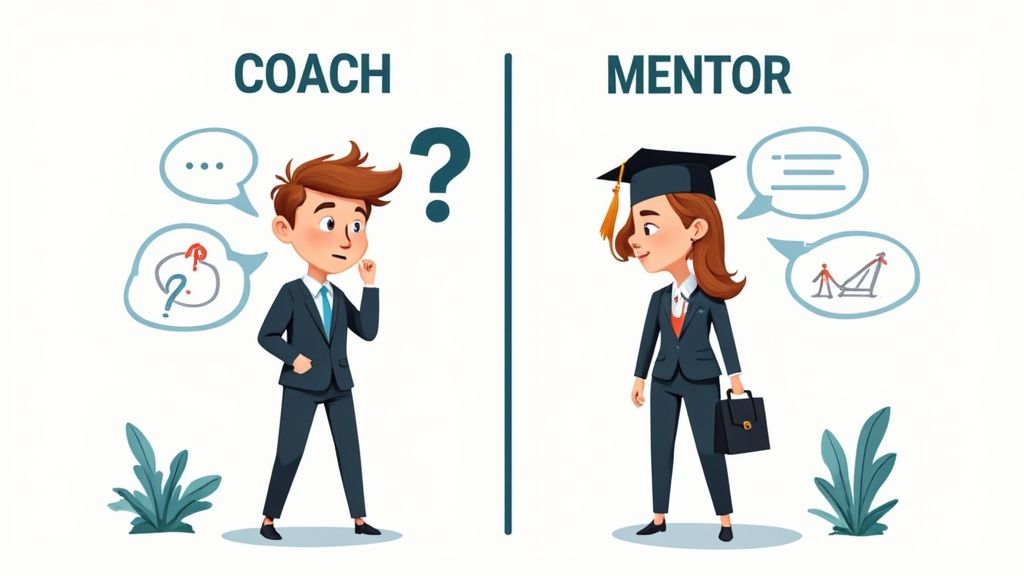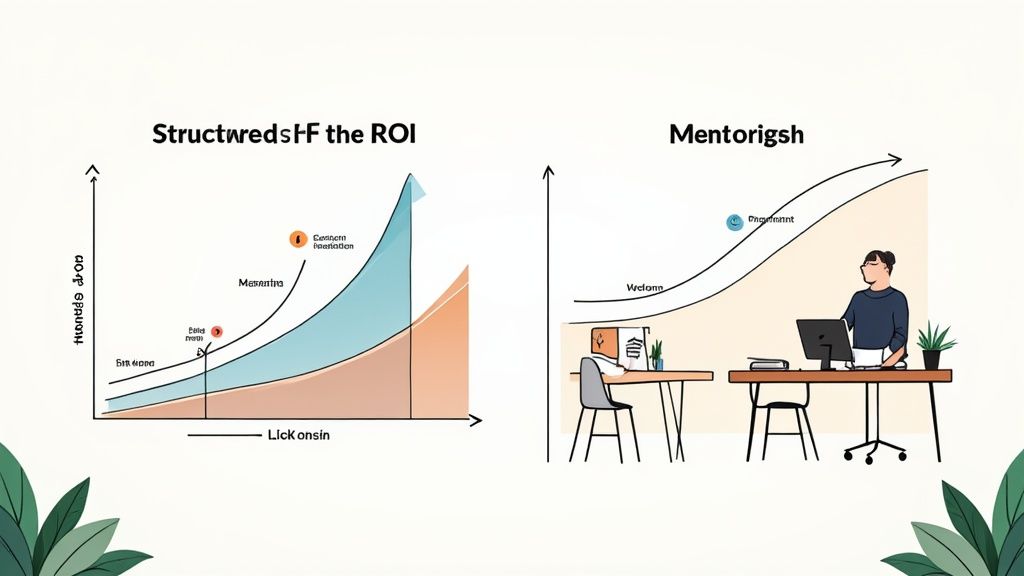Difference Coaching and Mentoring: 8 Essential Insights


Understanding Coaching and Mentoring
In the professional world, personal and professional development are crucial for success. Two popular approaches to achieving this growth are coaching and mentoring. These practices, with roots stretching back to ancient philosophical dialogues like those of Socrates (a form of early mentoring) and more modern coaching methodologies stemming from humanistic psychology, empower individuals to reach their full potential. Understanding the differences between these impactful strategies is essential for both those seeking guidance and those offering it. The effectiveness of each approach depends on individual goals, needs, and the desired outcome.
This article explores the nuances of coaching and mentoring, examining their historical and theoretical foundations and highlighting the key elements that contribute to their effectiveness. By understanding the 8 key differences between these two approaches, you can make informed decisions about which path best suits your personal and professional development journey.
Defining Coaching and Mentoring
Coaching is a structured process focused on specific skills and performance improvement. It often involves a trained coach who guides the individual through a series of goal-oriented sessions. Learn more about coaching
Mentoring, on the other hand, is a more relational process, where a more experienced individual (the mentor) shares their knowledge, insights, and guidance with a less experienced individual (the mentee). Learn more about mentoring
Key Differences Between Coaching and Mentoring
Understanding the distinctions between coaching and mentoring is critical for choosing the right approach. Here's a closer look at the eight key differences:
Focus: Coaching focuses on specific skills and performance goals, while mentoring emphasizes broader career development and personal growth.
Structure: Coaching is typically more structured and formal, while mentoring is often more informal and flexible.
Duration: Coaching engagements are usually time-bound, whereas mentoring relationships can last for extended periods.
Expertise: Coaches are often trained professionals with expertise in specific areas, while mentors may or may not have formal training but possess valuable experience and knowledge.
Relationship: The coaching relationship is often more transactional, while the mentoring relationship is more relational and built on trust.
Goals: Coaching goals are specific and measurable, while mentoring goals are broader and may evolve over time.
Accountability: In coaching, the individual is accountable for their progress, while in mentoring, accountability is shared between the mentor and mentee.
Outcome: Coaching aims to improve specific skills or performance, while mentoring aims to foster overall professional and personal growth.
By grasping these core differences, you can better navigate your development journey and choose the approach that best aligns with your needs and aspirations.
Goal-Oriented Coaching Vs. Development-Oriented Mentoring
One of the most fundamental differences between coaching and mentoring lies in their core orientations. Coaching is primarily goal-oriented, while mentoring is development-oriented. This key distinction is important for both individuals seeking growth and organizations looking to maximize their human capital. It shapes the structure, implementation, and ultimately, the effectiveness of each approach.

Coaching, with its emphasis on immediate performance improvement, operates within a defined timeframe. It concentrates on achieving specific, measurable objectives. Think of it as a targeted intervention designed to enhance a particular skill or overcome a specific challenge. A coach guides the individual through a structured process to reach these pre-determined goals.
Mentoring, conversely, takes a broader approach to development. It's a long-term relationship focused on overall professional and personal growth. A mentor shares their experience, knowledge, and insights, providing guidance and support. The mentee, in turn, navigates their career path and explores their potential. This relationship is less structured and evolves organically based on the mentee's needs and aspirations.
Comparing Coaching and Mentoring
Here's a breakdown of the key features of coaching and mentoring:
- Coaching: Focuses on immediate performance improvement, specific objectives, and a structured approach with defined outcomes.
- Mentoring: Emphasizes long-term career development, holistic growth, and a fluid approach evolving with the mentee's needs.
Understanding the Distinction: Pros and Cons
Recognizing the difference between coaching and mentoring offers several advantages:
- Right Approach, Right Time: Organizations can deploy the appropriate method for specific needs, maximizing impact and ROI.
- Stronger Relationships: It facilitates better matching of individuals with coaches or mentors, leading to stronger, more productive relationships.
However, some challenges exist:
- Blurred Lines: The line between coaching and mentoring can blur in practice, causing confusion and potentially ineffective interventions.
- Mismatched Approaches: Organizations might choose one approach when the other would be more effective, hindering individual and organizational growth.
Real-World Examples
Several prominent companies effectively utilize both coaching and mentoring:
- Google: Implements short-term coaching programs for specific skills like presentation skills or project management, alongside longer-term mentoring relationships for leadership development.
- Microsoft: Uses coaching for targeted performance improvement within specific roles and mentoring for talent development pipelines, nurturing future leaders.
The Growing Importance of Coaching and Mentoring
The increasing popularity of both coaching and mentoring highlights the recognized importance of continuous learning and development. Organizations are realizing that investing in employee growth benefits both the individual and the organization as a whole.
Practical Tips for Implementation
Consider these tips when implementing coaching or mentoring programs:
- Needs Assessment: Carefully assess whether the primary need is immediate performance improvement or long-term development.
- Combined Approach: Using both coaching and mentoring in tandem can create a more comprehensive development strategy.
- Clear Communication: Clearly communicate the purpose and expected outcomes of each approach to everyone involved.
Understanding the distinction between goal-oriented coaching and development-oriented mentoring is critical. By recognizing the nuances of each, individuals and organizations can leverage their respective strengths to achieve specific goals and cultivate long-term growth.
Direction Vs. Guidance: Understanding Coaching and Mentoring
A core difference between coaching and mentoring lies in their methodologies: direction versus guidance. Grasping this distinction is key for both practitioners and those seeking personal or professional growth. It clarifies roles, expectations, and potential outcomes.

Coaching often uses a more directive approach. Picture a skilled navigator helping you chart a course to a specific destination. Coaches lead structured sessions, frequently utilizing established frameworks and models. The focus is on achieving pre-defined goals, such as honing a particular skill or overcoming a performance obstacle. Sessions follow a structured agenda to ensure focused progress.
For example, KPMG's coaching programs are recognized for their structured approaches designed to cultivate specific leadership and technical skills within their workforce. This targeted approach can accelerate skill development in specific areas.
Mentoring, conversely, embraces a guidance-based methodology. Imagine a seasoned advisor sharing their wisdom and insights to empower you on your personal journey. Mentors leverage their experiences and institutional knowledge to offer perspectives and advice, enabling mentees to discover their own solutions.
Conversations are more organic, directed by the mentee, nurturing self-discovery and personalized growth. General Electric, for instance, has a robust mentoring culture where senior leaders guide emerging talent. This involves sharing their institutional knowledge and learned experiences, helping navigate the complexities of the corporate world. This individualized approach allows for broader exploration and development tailored to the individual's unique aspirations.
Features Comparison
| Feature | Coaching (Directive) | Mentoring (Guidance) |
|---|---|---|
| Approach | Structured, outcome-oriented | Organic, mentee-driven |
| Methods | Frameworks, models, specific exercises | Sharing experiences, insights, institutional knowledge |
| Session Structure | Formal agenda, defined milestones | Flexible, adaptable to mentee's needs |
Pros & Cons
| Approach | Pros | Cons |
|---|---|---|
| Coaching | Faster skill development in specific areas | May limit exploration of broader issues |
| Mentoring | Personalized development, broader perspective | May lack accountability for achieving specific outcomes |
Evolution and Key Figures
The structured methodologies prevalent in coaching rose to prominence through the work of individuals like Sir John Whitmore, a pioneer in the field. His work underscored a more structured, process-driven approach to coaching. Likewise, David Clutterbuck's contributions to mentoring have helped formalize and disseminate best practices for mentoring relationships, highlighting the value of guidance and shared experience.
Practical Tips for Implementation
Consider Learning Styles: Recognize individual learning styles and preferences. Some flourish in structured settings, while others prefer a more exploratory route.
Set Clear Expectations: Establish clear expectations upfront about the level of direction or guidance to be provided. This ensures everyone is on the same page.
Document Methodologies: Document the agreed-upon methodologies to maintain clarity and offer a framework for assessing progress. This fosters a shared understanding of the process.
By recognizing the differences between direction and guidance methodologies, individuals and organizations can effectively utilize both coaching and mentoring to maximize their growth potential. Understanding these differences ensures that the chosen approach aligns with individual needs and objectives, leading to more meaningful and lasting results.
Expertise Requirements For Coaches Vs. Mentors
A key difference between coaching and mentoring lies in the expertise each role demands. Understanding this difference is crucial for those seeking professional development and those considering becoming a coach or mentor. Knowing the distinction helps clarify which approach best aligns with individual needs and objectives.

Coaches excel in the process of coaching, not necessarily the coachee's specific field. They possess refined coaching skills, honed questioning techniques, and high emotional intelligence. Rather than giving direct advice, coaches empower coachees to discover their own solutions through self-reflection. Mentors, conversely, are seasoned professionals in the mentee's field. They offer field-specific guidance, share their career path, and provide insights gleaned from their own experiences.
Comparing Coaches and Mentors
Here’s a breakdown of the key features, pros, and cons of each:
| Feature | Coach | Mentor |
|---|---|---|
| Expertise | Coaching Process | Specific Field |
| Guidance Style | Facilitates Self-Discovery | Provides Direct Advice & Shares Experiences |
| Pro | Coach | Mentor |
|---|---|---|
| Versatility | Works Across Various Industries | Offers In-Depth Industry Knowledge |
| Con | Coach | Mentor |
|---|---|---|
| Industry Context | May Lack Specific Nuances | May Over-Rely on Personal Experience |
Real-World Examples
- A certified coach from the International Coach Federation (ICF) can work with clients across diverse sectors like technology, healthcare, and finance. Their coaching skills apply regardless of the industry.
- A senior law firm partner mentoring an associate can provide targeted advice based on years of experience in legal practice, navigating courtroom procedures, and cultivating a client base.
The Role of Professional Organizations
Organizations like the ICF and the European Mentoring and Coaching Council (EMCC) have played a vital role in defining and promoting the distinct roles of coaching and mentoring. The ICF, specifically, has set rigorous standards for coach training and certification, highlighting core competencies such as active listening and creating awareness. This emphasis on process has solidified coaching as a unique profession, separate from the more experience-based mentoring relationship.
Practical Tips For Choosing Support
- Choosing a Coach: Look for strong coaching credentials, a defined methodology, and a compatible approach, rather than focusing on their industry background.
- Selecting a Mentor: Prioritize experience in your field or desired career path. Ensure they can offer the specific insights and connections you seek.
- Consider Your Needs: Determine if you need process expertise (coaching) or content expertise (mentoring). Are you looking to develop a skillset or gain specific industry knowledge?
Understanding the different expertise coaches and mentors offer is essential for making informed decisions about professional growth. By recognizing the unique value of each role, individuals can leverage both coaching and mentoring to achieve their goals.
Relationship Dynamics and Duration
One of the most significant differences between coaching and mentoring lies in the relationship's nature and duration. Understanding these dynamics is crucial for both coaches and individuals seeking personal or professional development, as it directly impacts each approach's effectiveness.
Coaching relationships are typically structured, formal, and time-bound. Think of them as project-based collaborations with a defined beginning and end. Often established through a contract, these engagements frequently last 3-6 months and focus on achieving specific, pre-defined objectives within that timeframe. Regular, scheduled sessions are a hallmark of coaching, ensuring consistent progress and accountability toward the agreed-upon goals. For example, executive coaching programs at Deloitte often follow this model, utilizing a 6-month timeframe with clearly defined goals for leadership development. This time-bound nature creates a sense of urgency and focus, propelling the coachee toward desired outcomes.
Mentoring, conversely, is characterized by a more organic, long-term, and informal approach. These relationships often evolve naturally over months or even years, adapting to the mentee's evolving needs and circumstances. Rather than adhering to a strict schedule, mentoring interactions may occur on a more as-needed basis, driven by the mentee's questions, challenges, or desire for guidance. Goldman Sachs' mentoring program, pairing junior and senior professionals for long-term career development, exemplifies this approach. The extended duration of mentoring fosters deeper trust and facilitates more holistic development, encompassing not just specific skills but also broader career trajectory and personal growth.
This divergence in relationship dynamics has significant implications. The structured nature of coaching, with its defined endpoints, ensures focused progress but may not allow sufficient time to address deeper, underlying issues. Conversely, while mentoring's open-ended nature promotes trust and holistic development, it can sometimes lack structure or become too casual, hindering progress if not actively managed.
Pros and Cons
| Feature | Coaching | Mentoring |
|---|---|---|
| Duration | Time-bound (e.g., 3-6 months) | Long-term (often years) |
| Formality | Formal, often contractual | Informal, organic |
| Session Frequency | Regular, scheduled | As-needed |
| Pros | Focus, urgency, accountability | Deeper trust, holistic development |
| Cons | May not address deeper issues | Can lack structure, become too comfortable |
Tips for Effective Implementation
Coaching: Establish clear timelines, objectives, and expectations at the outset of the relationship. This clarity ensures both coach and coachee are aligned on the engagement's scope and duration.
Mentoring: Build in regular check-ins to evaluate the mentoring relationship's health and effectiveness. These discussions provide opportunities to reaffirm goals, address any roadblocks, and ensure the relationship continues to serve the mentee's needs.
Transitioning: Consider the possibility of transitioning from a coaching to a mentoring relationship as the coachee's needs evolve. This transition can provide a natural progression for continued growth and support.
The distinct relationship dynamics inherent in coaching and mentoring underscore why understanding this difference is critical. Choosing the right approach—or combining both strategically—depends on the individual's specific needs, goals, and developmental stage. By recognizing the unique attributes of each, individuals can maximize the benefits of both coaching and mentoring in their personal and professional journeys.
Question-Based Coaching vs. Experience-Based Mentoring
A key difference between coaching and mentoring lies in their core approaches: question-based vs. experience-based. This distinction shapes how individuals learn and grow.
Coaching operates on the principle that individuals possess inner wisdom and untapped potential. Coaches use insightful questions to guide self-discovery, acting as facilitators rather than direct advisors. This approach, sometimes called Socratic questioning, encourages critical thinking and fosters ownership of solutions. A coach might ask, "What possibilities do you see?" or "What's one actionable step you can take today?" This empowers the individual to explore their own perspectives and develop a personalized plan. The Co-active coaching methodology strongly emphasizes this question-driven approach.
Mentoring, conversely, draws upon the mentor's accumulated experience and knowledge. Mentors share insights and lessons learned, offering practical shortcuts and helping mentees navigate potential pitfalls. This prevents "reinventing the wheel." A mentor might offer a proven strategy, provide feedback based on their experience, or connect the mentee with valuable contacts. IBM's reverse mentoring program, where junior employees mentor senior leaders on digital trends, exemplifies this approach.
Pros and Cons of Each Approach
- Question-Based Coaching Pros: Cultivates self-reliance, fosters lasting solutions, and strengthens problem-solving skills.
- Question-Based Coaching Cons: Can be less satisfying for those seeking direct answers and may not be ideal when immediate action is required.
- Experience-Based Mentoring Pros: Offers practical guidance, accelerates learning, and helps avoid common mistakes.
- Experience-Based Mentoring Cons: May limit independent thinking and potentially create over-reliance on the mentor's perspective.
Practical Tips for Coaches and Mentors
For Coaches: Hone your ability to craft open-ended questions that prompt reflection. Explore various questioning frameworks to broaden your toolkit. Michael Bungay Stanier's "The Coaching Habit" provides valuable guidance.
For Mentors: Develop effective storytelling skills to make your shared experiences more impactful. Tailor your advice to the mentee's specific challenges. Timothy Gallwey's "The Inner Game" offers insights into learning and performance dynamics.
Finding the Right Balance
Understanding the core difference between coaching and mentoring is essential for choosing the most effective approach. While pure coaching unlocks inner potential through questions, mentoring provides practical guidance based on experience. Often, a blend of both approaches yields the best results, balancing self-discovery with actionable advice. Knowing when to ask and when to share is the key to maximizing the impact of these developmental relationships.
Formal Certification and Qualification: Key Differences
A key difference between coaching and mentoring lies in their approach to formal certifications and qualifications. Understanding this distinction is important for both those seeking these services and those looking to offer them. This affects quality assurance, accessibility, and the overall development of both fields.
Coaching, being a relatively new profession, has focused on developing standardized competency frameworks and certification levels. Organizations like the International Coach Federation (ICF), the Association for Coaching (AC), and the European Mentoring and Coaching Council (EMCC) have been instrumental in shaping the certification process. These organizations typically require aspiring coaches to complete a certain number of training hours, log supervised coaching practice, and adhere to a code of ethics. For example, the ICF requires Professional Certified Coaches (PCC) to complete 125+ training hours and 500+ coaching hours. These standards aim to ensure a baseline level of competency and ethical practice.
Mentoring, with its roots in informal relationships, takes a different tack. Mentor qualifications often emphasize professional achievement, experience, and demonstrated leadership. While formal mentoring certifications do exist, they aren't as universally adopted or essential as coaching certifications. Many companies, like McKinsey, select mentors based on internal performance and leadership, rather than formal qualifications. This focus on practical experience reflects mentoring's organic nature, where knowledge is shared through professional networks.
Comparing Coaching and Mentoring Qualifications
| Feature | Coaching | Mentoring |
|---|---|---|
| Framework | Standardized competency frameworks & levels | Experience & demonstrated leadership capabilities |
| Training | Extensive specialized training | Often informal, based on practical experience |
| Certification | Widely adopted and often considered essential | Less common, not always required |
Pros and Cons of Different Qualification Approaches
Coaching Pros: Certifications offer quality assurance and enforce ethical guidelines, giving clients confidence.
Mentoring Pros: Flexible qualification requirements make mentoring accessible to experienced professionals, encouraging organic relationships.
Coaching Cons: Certification can present financial and time barriers for aspiring coaches.
Mentoring Cons: Lack of standardized qualifications can sometimes result in inconsistencies in mentoring quality.
Practical Tips for Finding the Right Fit
- Finding a Coach: Seek recognized credentials like ICF or EMCC certifications. These demonstrate a commitment to professional standards.
- Finding a Mentor: Prioritize relevant experience and a strong professional reputation. Consider their track record and leadership qualities.
- For Organizations: Developing internal mentor training programs can standardize mentoring quality and align it with company values. This helps mitigate risks associated with inconsistent mentoring.
The differing approaches to certification reflect the distinct nature of coaching and mentoring. Coaching, with its focus on structured processes and outcomes, leans toward standardization. Mentoring, emphasizing relationship building and shared experience, relies more on an individual's proven capabilities. Understanding these differences is key for anyone seeking personal and professional development.
Agenda Control and Session Structure
One of the key differences between coaching and mentoring lies in who controls the agenda. This seemingly small difference significantly impacts the relationship's power dynamics, focus, and outcomes. Understanding this distinction is crucial for both coaches and individuals seeking development.
In coaching, the coachee sets the agenda. They determine the topics discussed in each session. The coach facilitates the process, guides the conversation, and supports the coachee in finding their own solutions. This coachee-led approach fosters ownership and commitment.
A common example is the GROW model (Goals, Reality, Options, Way Forward), popularized by Sir John Whitmore. This model provides a framework for coaching conversations while keeping the agenda with the coachee. Stakeholder Centered Coaching, developed by Marshall Goldsmith, also emphasizes coachee-defined goals.
Mentoring often involves a more shared approach. While the mentee's needs are central, the mentor may suggest topics based on their experience. This input can be invaluable in helping the mentee identify blind spots and broaden their perspective. For example, Facebook's mentoring program encourages mentees to lead while providing mentors with resources and suggestions.
This difference in agenda control also influences session structure. Coaching sessions often follow a consistent structure focused on the coaching process, using techniques like active listening and goal setting. Mentoring sessions can be more fluid, adapting to the specific learning need.
Pros and Cons of Different Agenda Approaches
Coachee-Led Agenda (Coaching):
- Pro: Ensures relevance and commitment.
- Con: Potential blind spots may be missed.
Mentor-Influenced Agenda (Mentoring):
- Pro: Provides valuable perspective.
- Con: May not always align with immediate priorities.
Practical Tips for Implementation
Establish Clear Expectations: From the outset, define who owns the agenda. This transparency prevents misunderstandings.
Consider a Session Planning Template: A simple template can help structure conversations and ensure key topics are addressed, particularly in mentoring.
Regularly Review the Agenda Balance: Periodically check in to ensure the approach is working effectively for both parties. Be flexible and adjust as needed.
Understanding agenda control is fundamental to differentiating coaching and mentoring. Recognizing these nuances empowers individuals to choose the relationship that best suits their needs and maximizes their development potential.
Implementing Coaching and Mentoring Programs
Implementing and measuring the success of coaching and mentoring programs is crucial for demonstrating their value and securing ongoing investment. However, coaching and mentoring require different approaches due to their unique characteristics and goals. Understanding these differences is key to successful implementation and demonstrating a strong return on investment (ROI).

Coaching Program Implementation
Coaching programs, focused on targeted skill development and performance enhancement, generally follow a structured format. This includes clearly defined objectives, formal matching procedures based on skill gaps and developmental needs, and predetermined metrics for measuring ROI. These metrics often emphasize tangible results such as improved performance reviews, increased sales, or higher client satisfaction scores.
For instance, PwC uses before-and-after performance metrics and client satisfaction surveys to evaluate the effectiveness of its coaching initiatives. This structured approach simplifies budget justification and clearly demonstrates value. Coaching programs often have set start and end dates with regular checkpoints for assessment.
Mentoring Program Implementation
Mentoring programs, conversely, emphasize long-term growth and relationship building. They tend to be more organic, with less rigid structures, relationship-based matching based on common interests and experiences, and more holistic developmental outcomes. Measuring the ROI of mentoring can be more complex due to the less tangible nature of its benefits.
Metrics such as retention rates, promotion speed, and employee engagement often serve as indicators of success. Intel, for example, monitors the retention rates and promotion speed of participants in its mentoring programs to assess their impact. Mentoring programs are typically ongoing with more flexible evaluation methods.
Comparing Coaching and Mentoring Programs
Here’s a quick comparison of coaching and mentoring programs:
| Feature | Coaching | Mentoring |
|---|---|---|
| Duration | Defined start and end dates | Continuous |
| Evaluation | Specific measurement points | Flexible evaluation |
| ROI Measurement | Behavior change & performance metrics | Retention, career advancement, engagement |
Measuring Program ROI
The increasing focus on quantifiable results in talent development has led to the growing importance of ROI measurement for both coaching and mentoring programs. Research from institutions like Harvard Business Review on coaching ROI and guidance from the Association for Talent Development (ATD) on best practices for mentoring programs have helped formalize these measurement approaches.
Tips for Successful Implementation
- Establish Clear Metrics: Define what success looks like for both programs from the beginning.
- Use a Mixed-Methods Approach: Combine quantitative and qualitative data to capture the full program impact.
- Strategic Alignment: Ensure program measurement aligns with overall organizational goals.
- Balanced Scorecard: Use a balanced scorecard to capture both short-term and long-term benefits.
Implementing and evaluating coaching and mentoring programs effectively is crucial for maximizing their impact and demonstrating value to stakeholders. By understanding these nuances, organizations can create robust and sustainable programs that contribute to both individual and organizational growth.
8-Point Coaching vs. Mentoring Comparison
| Concept | Implementation Complexity (🔄) | Resource Requirements (⚡) | Expected Outcomes (📊) | Ideal Use Cases (💡) | Key Advantages (⭐) |
|---|---|---|---|---|---|
| Goal-Oriented vs. Development-Oriented Approaches | Coaching: Structured with defined outcomes; Mentoring: Fluid & evolving | Coaching: Dedicated sessions & frameworks; Mentoring: Leverages ongoing relationships | Coaching: Immediate performance improvement; Mentoring: Long-term holistic growth | Coaching: Specific skill improvement; Mentoring: Leadership & career development | Coaching: Clear focus & measurable results; Mentoring: Broad personal development |
| Direction vs. Guidance Methodology | Coaching: Directive & structured sessions; Mentoring: Guidance-based and organic | Coaching: Standardized frameworks; Mentoring: Relies on mentor’s personal experience | Coaching: Faster skill development; Mentoring: Personalized developmental insights | Coaching: When clear, immediate direction is needed; Mentoring: For tailored long-term guidance | Coaching: Efficient structured learning; Mentoring: Flexible, adaptive support |
| Expertise Requirements for Coaches vs. Mentors | Coaching: Emphasis on coaching skills (process-focused); Mentoring: Requires domain-specific expertise | Coaching: Trained facilitators with questioning abilities; Mentoring: Experienced industry professionals | Coaching: Cross-industry development; Mentoring: In-depth, field-specific insights | Coaching: Generic skill enhancement; Mentoring: Sector-specific career guidance | Coaching: Broad applicability; Mentoring: Deep contextual relevance |
| Relationship Dynamics and Duration | Coaching: Formal, time-bound engagements; Mentoring: Informal & gradually evolving | Coaching: Regular, scheduled sessions; Mentoring: Organic, flexible interactions | Coaching: Targeted improvements within set timeframe; Mentoring: Trust-building & long-term growth | Coaching: For short-term performance boosts; Mentoring: For sustained personal & professional growth | Coaching: Clear deadlines & focus; Mentoring: Holistic, enduring development |
| Question-Based vs. Experience-Based Approaches | Coaching: Uses strategic, open-ended questioning; Mentoring: Centers on sharing personal experiences | Coaching: Frameworks for self-discovery; Mentoring: Taps into mentor’s experiential insights | Coaching: Sustainable, self-derived solutions; Mentoring: Practical shortcuts from proven experiences | Coaching: When self-reflection is key; Mentoring: When historical insights accelerate learning | Coaching: Empowers through inquiry; Mentoring: Offers immediate experiential wisdom |
| Formal Certification and Qualification Differences | Coaching: Formal, structured certification pathways; Mentoring: Informal & experience-based | Coaching: Investment in training & credentials; Mentoring: Leverages professional reputation | Coaching: Verified quality and adherence to standards; Mentoring: Flexible, accessible guidance | Coaching: When standardized expertise is required; Mentoring: When practical experience suffices | Coaching: Assurance of competence & ethical standards; Mentoring: Broader reach with fewer barriers |
| Agenda Control and Session Structure | Coaching: Coachee-led agenda with structured facilitation; Mentoring: Joint/mentor-led flexible agenda | Coaching: Utilizes structured models (e.g., GROW); Mentoring: Adaptive discussion-based sessions | Coaching: Focused goal attainment; Mentoring: Broader developmental insights | Coaching: When clear process & ownership are crucial; Mentoring: For exploratory dialogue | Coaching: Enhanced commitment & clarity; Mentoring: Integration of mentor’s expertise |
| Organizational Implementation and ROI Measurement | Coaching: Highly structured with defined metrics; Mentoring: Organic with flexible evaluation | Coaching: Formal matching processes & oversight systems; Mentoring: Uses existing relationships & qualitative measures | Coaching: Measurable performance improvements; Mentoring: Broader career advancement & retention | Coaching: When ROI and specific results are needed; Mentoring: For long-term cultural & developmental benefits | Coaching: Accountability with clear ROI; Mentoring: Adaptability & sustained growth |
Making the Right Choice: Coaching or Mentoring?
Understanding the differences between coaching and mentoring is crucial for reaching your full potential. Coaching, with its action-oriented and question-driven approach, is highly effective for developing specific skills and overcoming immediate obstacles. Mentoring, conversely, uses experience-based guidance and long-term relationships to encourage overall growth and navigate broader career journeys.
Which approach is best for you depends on your individual needs and goals. Are you seeking targeted skill development, or broader career advice? Do you prefer structured meetings with a set agenda, or more informal discussions based on shared experiences? Considering these questions, along with the differences in expertise, relationship dynamics, and formal qualifications, will enable you to make an informed decision.
Applying Coaching and Mentoring Concepts
Effectively applying these concepts requires understanding your current situation, your desired future, and the type of support that will best bridge that gap. You might need a coach to help you improve your communication skills for an upcoming promotion, or a mentor to guide you through the intricacies of changing careers.
Don’t hesitate to try different approaches and adapt as your needs change. You might even find that a combination of coaching and mentoring provides the ideal level of support.
Keeping Up with Evolving Practices
The fields of coaching and mentoring are constantly evolving. Current trends include the growth of virtual coaching and mentoring platforms like CoachHub, the increasing demand for specialized coaching niches, and the use of technology to improve the coaching experience. Staying informed about these developments will ensure you’re using the most effective tools and techniques to reach your objectives.
Key Takeaways:
- Coaching: Action-oriented, question-driven, focused on specific skills and short-term goals.
- Mentoring: Development-oriented, experience-based, focused on holistic growth and long-term career guidance.
- Choosing the right approach: Consider your individual needs, desired outcomes, and preferred learning style.
- Adaptability: Be open to adjusting your approach as your circumstances and goals change.
Explore Coaching Hub, a blog dedicated to empowering coaches and personal development enthusiasts. Discover practical insights, proven techniques, and inspiring stories to enhance your coaching practice or personal growth journey. Visit and unlock your full potential.